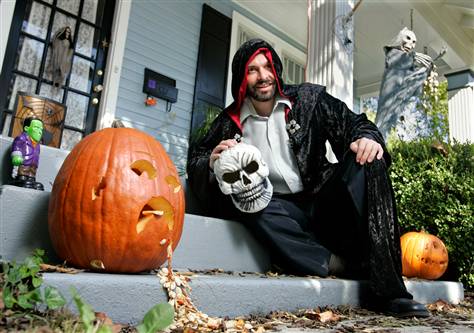Professor Turns House into Kids Fear Laboratory
Oct 31, 2007
Professor turns house into kids fear laboratory

In the lab, psychology professor David Zald studies how fast adults react to fear.
At his home this time of year, he watches kids adjust to it.
Zald, a professor at Vanderbilt University, turns his house in Nashville, Tenn., into a Halloween fear lab — with a reward of candy for those who brave it.
Skeletons hang from the tree, motion-activated sensors move objects around in a scary way and there’s a creepy fog floating around the house. Zald decorates in classic horror motif for fun, but the shrink in him can’t help but observe the classic fear response in children.
“They want the candy, but they’re not sure they want to come up,” says Zald, who in the past has dressed up as a devil but this year will be costumed as kitschy Disco Stu from the animated TV series “The Simpsons.”
By the end of the night, even the young children aren’t fazed by ghouls and goblins. They control their fear to get the reward of candy, Zald said, and they learn a healthy lesson.
Fear is a negative emotion and for millions of Americans, it’s disabling. Yet people love horror movies, and Halloween is a holiday that celebrates fear while rewarding children with sweets. There are scientific reasons for this odd mix.
“One of the odder aspects of human nature is our willingness to pay money to actually get scared,” Zald said. “Essentially we get off on the excitement. We get a high arousal state and we actually find that appealing.”
Physical chemical rewards for fear
There are physical chemical rewards in our brain when we experience fear, yet cheat an anticipated painful threat, psychologists say. And fear-induced hormones, such as adrenaline, are pleasurable at times.
“Part of the fun of Halloween is that it’s a way of experiencing fear in a pretty controlled setting,” said University of Michigan psychology professor Stephen Maren. “People enjoy the fun and surprises, but they’re putting themselves in situations where they are really not in danger.”
Some people need that kind of excitement, which is similar to the rush felt when playing sports, said New York psychologist Linda Sapadin, author of the book “Master Your Fears.”
“We do need some fear in our lives, otherwise things are too placid,” she said.
On the other hand, she noted, people who live in war zones, don’t go to horror movies.

In the lab, psychology professor David Zald studies how fast adults react to fear.
At his home this time of year, he watches kids adjust to it.
Zald, a professor at Vanderbilt University, turns his house in Nashville, Tenn., into a Halloween fear lab — with a reward of candy for those who brave it.
Skeletons hang from the tree, motion-activated sensors move objects around in a scary way and there’s a creepy fog floating around the house. Zald decorates in classic horror motif for fun, but the shrink in him can’t help but observe the classic fear response in children.
“They want the candy, but they’re not sure they want to come up,” says Zald, who in the past has dressed up as a devil but this year will be costumed as kitschy Disco Stu from the animated TV series “The Simpsons.”
By the end of the night, even the young children aren’t fazed by ghouls and goblins. They control their fear to get the reward of candy, Zald said, and they learn a healthy lesson.
Fear is a negative emotion and for millions of Americans, it’s disabling. Yet people love horror movies, and Halloween is a holiday that celebrates fear while rewarding children with sweets. There are scientific reasons for this odd mix.
“One of the odder aspects of human nature is our willingness to pay money to actually get scared,” Zald said. “Essentially we get off on the excitement. We get a high arousal state and we actually find that appealing.”
Physical chemical rewards for fear
There are physical chemical rewards in our brain when we experience fear, yet cheat an anticipated painful threat, psychologists say. And fear-induced hormones, such as adrenaline, are pleasurable at times.
“Part of the fun of Halloween is that it’s a way of experiencing fear in a pretty controlled setting,” said University of Michigan psychology professor Stephen Maren. “People enjoy the fun and surprises, but they’re putting themselves in situations where they are really not in danger.”
Some people need that kind of excitement, which is similar to the rush felt when playing sports, said New York psychologist Linda Sapadin, author of the book “Master Your Fears.”
“We do need some fear in our lives, otherwise things are too placid,” she said.
On the other hand, she noted, people who live in war zones, don’t go to horror movies.